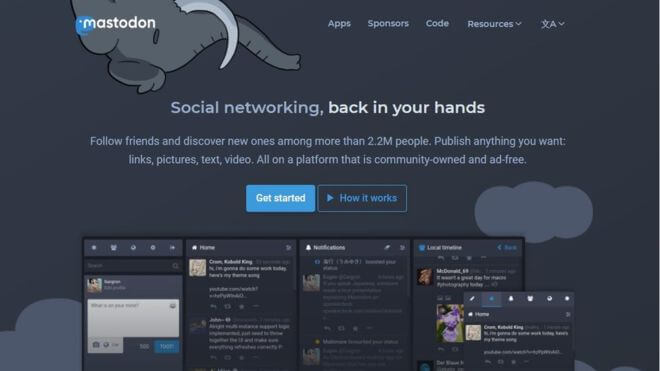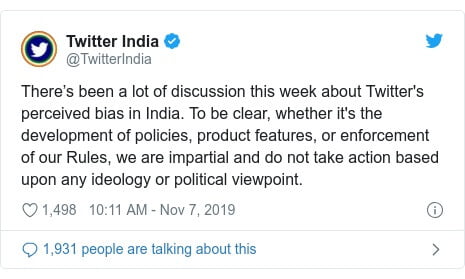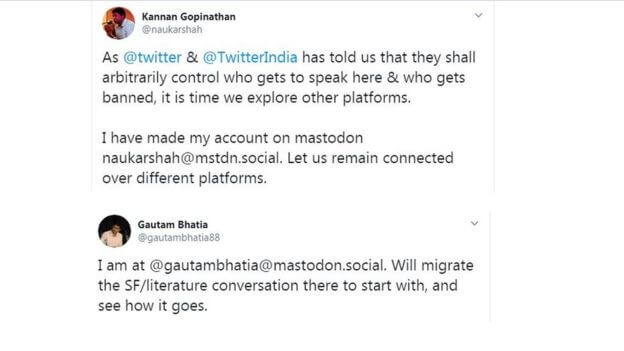Some of the most influential Twitter users in India are looking to move to the little-known Rival Mastodon network in the middle of a protest over Twitter moderation methods.
Twitter’s suspension of the account of a prominent Supreme Court lawyer twice fueled Mastodon’s apparent rising trend.
Users have told the BBC that they believe Twitter has a “highly inconsistent position” on issues such as hate speech. In contrast, they argue that Mastodon’s anti-abuse systems are much more robust.

The name of the smallest social network soon appeared on Twitter in India when users announced their new accounts.
However, it remains to be seen exactly how many have created an account, and how many will leave Twitter completely in favor of the Rival Mastodon platform.
So why were People Angry with Twitter?
Anger began to rise against the social network, which is said to have more than 30 million users in India alone after lawyer Sanjay Hegde suspended his account twice.
Sanjay Hegde’s Account Suspension
The first time was because he had retweeted a 1936 photograph of Nazi Germany in which a German citizen, August Landmesser, refused to perform the Nazi greeting, which Twitter said violated its rules on “hate images.”
“After a massive protest, Twitter restored my account but without the photo,” Hegde told Krutika Pathi of the BBC.
Soon after, Twitter took action against his account again, sending him an email with a notice to cancel a 2017 tweet, in which he retweeted a poem protesting against the hanging of two revolutionaries.
Twitter’s Content Moderation Policies
He had added the title of the poem – Hang it – in his tweet, which he believes “activated some automated robots in the Twitter backend.”
The two incidents sparked a broader discussion about how Twitter moderates its content in India, and many say the platform tolerates rhetoric against minorities.
Twitter has denied these charges. He published a statement saying he does not moderate his content based on “ideological or political” views.
Criticism and Concerns from Users and Experts
Critics, including regular Twitter users and tech experts, point out Twitter’s flawed content moderation record in India. Nikhil Pahwa, editor of Internet watchdog Medianama, told the BBC that Twitter “has not adequately tackled hate speech.”
Twitter’s Handling of Government Requests
A recent report by the Committee for the Protection of Journalists (CPJ) found that Twitter deleted almost a million tweets and blocked about 100 accounts in India as part of its “retained country” policy.
The report said that most of the blocked content was critical of the recent government movement to strip India-administered Kashmir of its semi-autonomous status, and it was done after the government’s requests.
Concerns Regarding Marginalized Groups and Women
“With Twitter, the problem is increasing: there is a growing sense that the platform is closing or suppressing voices that criticize the government. So there is a lot of concern about that,” said Nilanjana Roy, an author who recently signed up for a Mastodon account.
Dalit activists and writers (previously untouchables) have criticized the platform, claiming that Twitter routinely suspends their accounts while allowing problematic trends like #BoycottAllMuslims to continue.
Search for Alternatives
“The prejudice against marginalized groups (Dalits, women, religious minorities) on Twitter is very shameless,” says activist Kavitha Krishnan, who added that she has previously complained to the platform but had never received any response.
Others have also noted the lack of action the company has taken when it comes to women on Twitter, who regularly face death and rape threats.
“It’s not fun being a woman on Twitter and watching the abuse go by, you feel like you’re exposed to an industry that is continuously polluted,” Roy said.
“What this incident has also shown is that there is a search for something that is beyond Twitter. It could be Mastodon or it could be something else that we have not yet seen.”
What exactly is the mastodon?
Mastodon is an open-source network, where users can post, comment, follow other users, and post images and videos as in a conventional platform.
But the most significant aspect is its decentralization and open-source nature; this means that the network is not run by a single entity.
Instead, users create and run their servers. This means that the social network is made up of many servers, each of which has its own rules. This also allows users to choose servers that they believe comply with the policies with which they agree.
Mastodon as an Alternative
Mastodon was launched for the first time in October 2016 and the network claims to have more than 2.2 million users. Twitter has more than 300 million users.
While many have praised Mastodon as a great alternative to Twitter, some have pointed out that it is not so easy to use. It means that Mastodon is unlikely to take over, even in the long term.
Others have dismissed the movement to leave Twitter as “a fad” that probably won’t leave a mark.
If you are looking to get more likes on Twitter posts and more views then feel free to contact us.
FAQs
What is Rival Mastodon, and why is it a rival?
Users credit Mastodon’s recent rise in popularity to its decentralized nature, often seen as a rival to mainstream platforms such as Twitter.
Why are people talking about Mastodon?
The interest in Mastodon may stem from worries about privacy, censorship, or a preference for a community-oriented social platform. Users might be exploring alternatives that offer different features or values.
What makes Mastodon different?
Mastodon distinguishes itself by decentralizing, allowing users to join different instances (servers) or even host their own. This structure aims to provide more control over user data and content moderation policies.
Is Mastodon a significant threat to mainstream platforms?
While Mastodon’s recent attention suggests growing interest, it’s unlikely to replace mainstream platforms entirely. However, it highlights a growing trend of users seeking alternatives that prioritize privacy, decentralization, and community governance.
Conclusion
People are increasingly frustrated with how platforms like Twitter moderate content. Recently, there was a big buzz about Mastodon, a different kind of social media. It’s popular because it’s not controlled by one company, and users have more say in what’s allowed.
Mastodon works like a bunch of smaller communities instead of one big one. Each “community” can set its own rules for what’s okay and what’s not. Plus, Mastodon is open for anyone to see how it’s built and to help make it better.
Even though it might not become as big as Twitter or Facebook. Mastodon’s rise shows that people want social media that gives them more control and privacy. It’s a sign that users are looking for different options beyond the big players.


